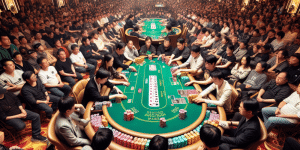Join me as I recount a gripping game of Texas Hold’em in the heart of rainy London, where the bluffs were as unpredictable as the weather.
It’s funny how the mood of a city can seep into its poker games. Maybe it’s the looming clouds or the perpetual drizzle that makes London games feel more intense, like every chip and card is carrying a bit more weight. Last night was one of those quintessentially English evenings — wet, chilly, and absolutely perfect for poker.
I found myself at a small, somewhat exclusive club not far from the bustling streets of Soho. It’s one of those places that doesn’t advertise much; you need to know someone who knows someone. The decor straddles the line between ostentatious and cozy, with dark wood panels and lush, red velvet curtains. It feels both welcoming and slightly secretive, a perfect setting for a high-stakes game of Texas Hold’em.
The table was a mix. Two aggressive types who bet like they’re trying to make up for something, a quiet old-timer who had the look of a seasoned pro, and a couple of tourists who seemed more interested in their Instagram feeds than the game. I was just glad to have my spot, nursing a lukewarm cup of tea, and trying not to look as eager as I felt.
The game started slow. I folded more hands than I played, trying to get a read on my opponents. It’s essential to understand who you’re up against — which players bluff, which are over-cautious, and who might just be unknowingly giving away their hand with every twitch or glance. About an hour in, with more chips out of my stack than I cared to admit, I caught a break. I was dealt a pair of Kings. Not bad, but in a table like this, anything could happen.
A few moderate bets were placed before the flop. The old-timer raised, the aggressive young guy to my right re-raised, and I called, trying not to let my heartbeat show. The flop laid down a King, a Ten, and a Two. There it was — a set of Kings. It was my game to lose now.
The air seemed to thicken as the old-timer checked. The aggressive player bet big, clearly trying to assert some dominance on the table. It felt overconfident, almost a desperate move. I could sense he didn’t have the cards and was probably trying to bluff his way through. I called, doing my best to look unsure, hoping to draw more chips into the pot. The tourist folded, and the old-timer called.
The turn was a Nine. No help to anyone, I suspected. The old-timer checked again, and the aggressive player hesitated—a telltale sign. He threw in half his stack. It was a bold move, the sort that could make or unmake a night. I called. The old-timer bowed out.
It came down to the river: a harmless Four. The aggressive player, now visibly sweating, went all-in. It was a bad beat waiting to happen, or a bluff—the kind of moment you live for in poker. I called immediately, almost interrupting his announcement. He turned over a Queen and a Jack — he’d been chasing a straight that never came. My set of Kings held strong, scooping up a sizable pot that shifted the night in my favor.
For the next few hours, I played with a lighter heart, the board running mostly in my favor. I didn’t win every hand, but I didn’t need to. I had proved my point and bolstered my stack. As the night drew to a close, the tourists left lighter than they’d arrived, the old-timer gave me a nod of respect, and the aggressive player disappeared into the London fog, hopefully a bit wiser.
Reflecting on the game during my cab ride back to the hotel, the most significant takeaway wasn’t just about reading others but also about the importance of patience and timing in poker. In London’s unpredictable poker rooms, much like its weather, sometimes the best strategy is to wait out the storm and play your best hand when the timing is just right.
As the city lights blurred past, I felt a mix of exhaustion and exhilaration—a feeling only a night of good poker could bring.
















